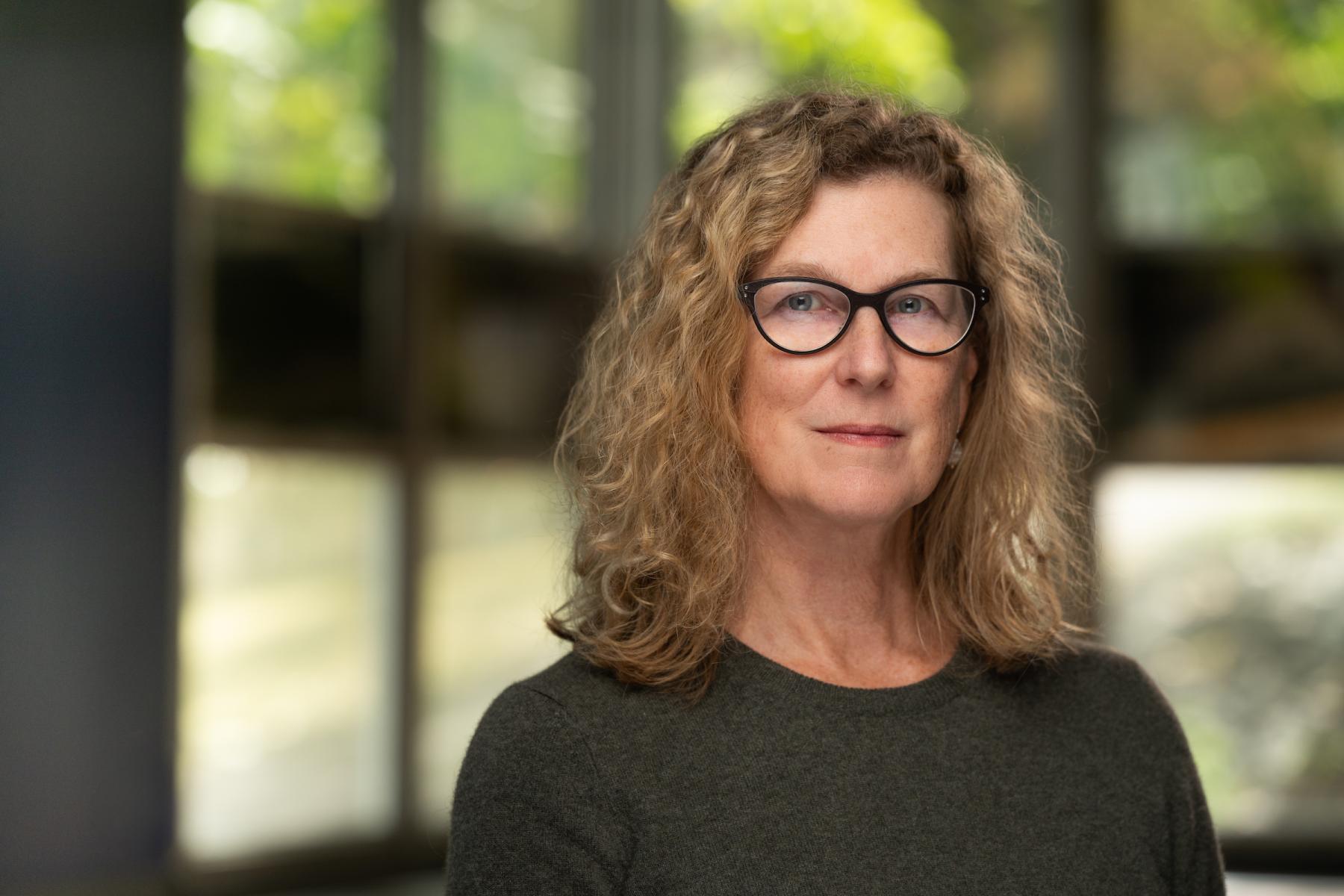The Davies Forum
The Davies Forum, established by the late Louise M. Davies of San Francisco in 1980, enhances the University’s efforts to produce future leaders dedicated to public service and ethical leadership. The forum's continuing theme, “The Search for Values in Contemporary America,” provides the USF community with the opportunity to examine the current state of American society.
Each semester, select undergraduate students from all majors are chosen to be Davies Scholars based on their records of academic excellence, extracurricular activities, personal integrity, and leadership ability. The scholars participate in the interdisciplinary Davies Seminar under the direction of that semester's Davies Professor.
Davies Forum - Spring 2026
The Spring 2026 Davies seminar is being taught by Dr. Ilaria Giglioli, a scholar of migration and borders. The upcoming course, Reimagining Border Justice from the Global South, will help the Davies scholars develop fresh perspectives on US-based debates about migration and border fortification by putting them in dialogue with scholarly debates and advocacy initiative occurring elsewhere in the world, with a focus on the Global South. This breaks with the north-centrism and Eurocentrism of much contemporary commentary on migration and bordering, offering fresh perspectives on questions of border and mobility justice. A global focus also allows students to raise innovative questions about responsibility and justice in the context of migration, with the aim of building bridges and solidarities between different marginalized populations. The course centers engaged scholarship and community initiatives, both globally and in the San Francisco Bay Area.
This course connects an interdisciplinary analysis of the current state of global border fortification with an in-depth exploration of engaged scholarship that advocates for the rights of migrants and refugees worldwide, as well as local organizations working for migration and border justice. This will be grounded in a rich conceptual discussion of what more just systems of regulating human mobility would look like.
Upcoming Events
Militarized Global Apartheid
Catherine Besteman, Colby College
The global war on terror waged after 9/11 precipitated an emergent world order of militarized apartheid - a loosely integrated effort by countries in the global north to protect themselves against the mobility of people from the global south while consolidating racialized labor hierarchies. Militarized security empires are emerging from and shoring up global apartheid, based in the identification and containment of “risky” bodies throughout the globe in concert with the expansion of securitized spaces produced through material, affective, and ontological expressions of militarism by the global north. These emergent imperial formations are spatial and technological rather than territorial, and they are taking shape through imperial projects that racialize and incarcerate people while securing cosmopolitan class privilege and capitalist extraction across borders.
Catherine Besteman is an abolitionist educator at Colby College. Her research focuses on carcerality, decarceration and abolition; security; militarism; displacement; and community-based activism with a focus on South Africa, Somalia, and the US. In addition to coordinating the abolitionist initiative Freedom & Captivity, she has published nine books, and received recent fellowships from the American Council of Learned Societies and the Guggenheim and Rockefeller Foundations.
Tuesday, March 10th, 2026
11:45 am, Zief Law Library
Inhabiting Transit: Migrant Spatial Struggles from South America to the U.S. and Back Again
Soledad Alvarez Velasco, University of Illinois, Chicago
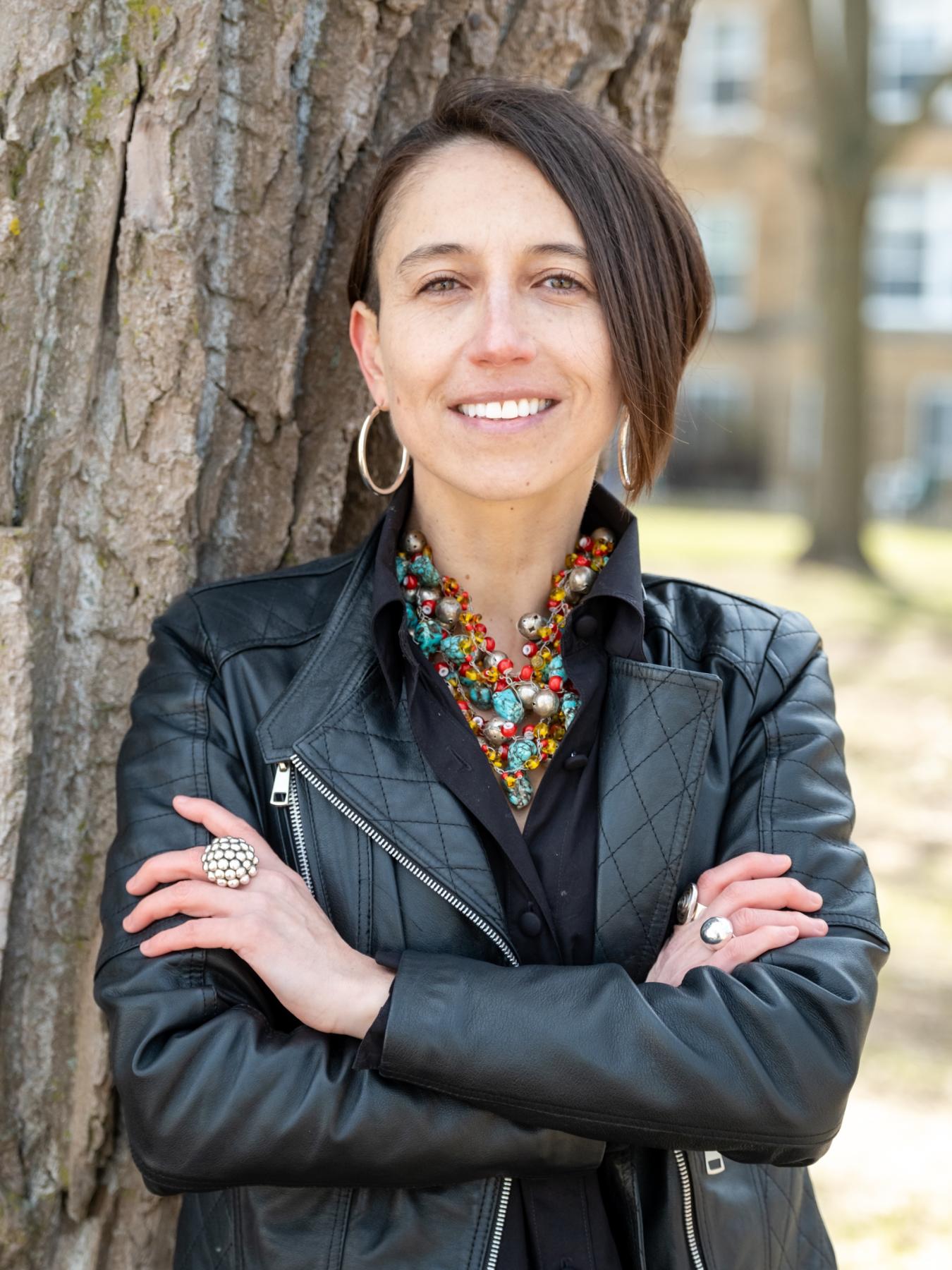
Trans-border migrant transits through the Americas have become a deeply political phenomenon. This talk examines the contemporary condition of inhabiting transit: being forced to restart journeys and dwell in a geography of uncertainty, living in a permanent state of (im)mobility in search of safety. Drawing on digital and multi-sited ethnography, historical research, and a migrant-centered approach, it reconstructs the journeys of 14 migrants from Syria, Iraq, Nigeria, Zimbabwe, Haiti, Cuba, and Venezuela, whom I met in Quito, Metetí, and Houston between 2016 and 2022. Their trajectories from their countries of origin to Ecuador, Colombia, and Brazil became prolonged, repeated transits across South American cities and borders before heading toward the U.S.—and, in some cases, back south as part of contemporary reverse transit. The talk analyzes how these South–South, South–North, and North–South movements collide with violence, uneven geographical development, and racialized, exclusionary border regimes. At its core, it centers migrants’ flights and fights—their struggles for movement, survival, and belonging.
Dr. Soledad Álvarez Velasco is a social anthropologist and human geographer whose research analyzes the interrelationship between mobility, control, and spatial transformations across the Americas. She holds a Ph.D. in Human Geography from King’s College London. Before joining the University of Illinois Chicago in January 2023 as an Assistant Professor in the Departments of Anthropology and Latin American and Latino Studies, she was an Assistant Professor at Heidelberg University. She is the author of Frontera sur chiapaneca: El muro humano de la violencia (Mexico: CIESAS-UIA, 2016), and her research has been published in Geopolitics, Antipode, the Journal of Latin American and Caribbean Geography, Studies in Social Justice, Migration and Society, the ANNALS of the American Academy of Political and Social Science, and other academic journals in both English and Spanish. During the 2025–26 academic year, she will be a resident scholar at the UIC Institute for the Humanities, where she will complete her current book manuscript, Inhabiting Transit: The Migrant Spatial Struggle from Global South America to the U.S.
Thursday, March 26th 2025
11:45 am, Maier Room, Fromm Hall
Humanizando la Deportación/el Asilo: Human Mobilities and Immobilizations 2016-2026
Robert Irwin, University of California Davis
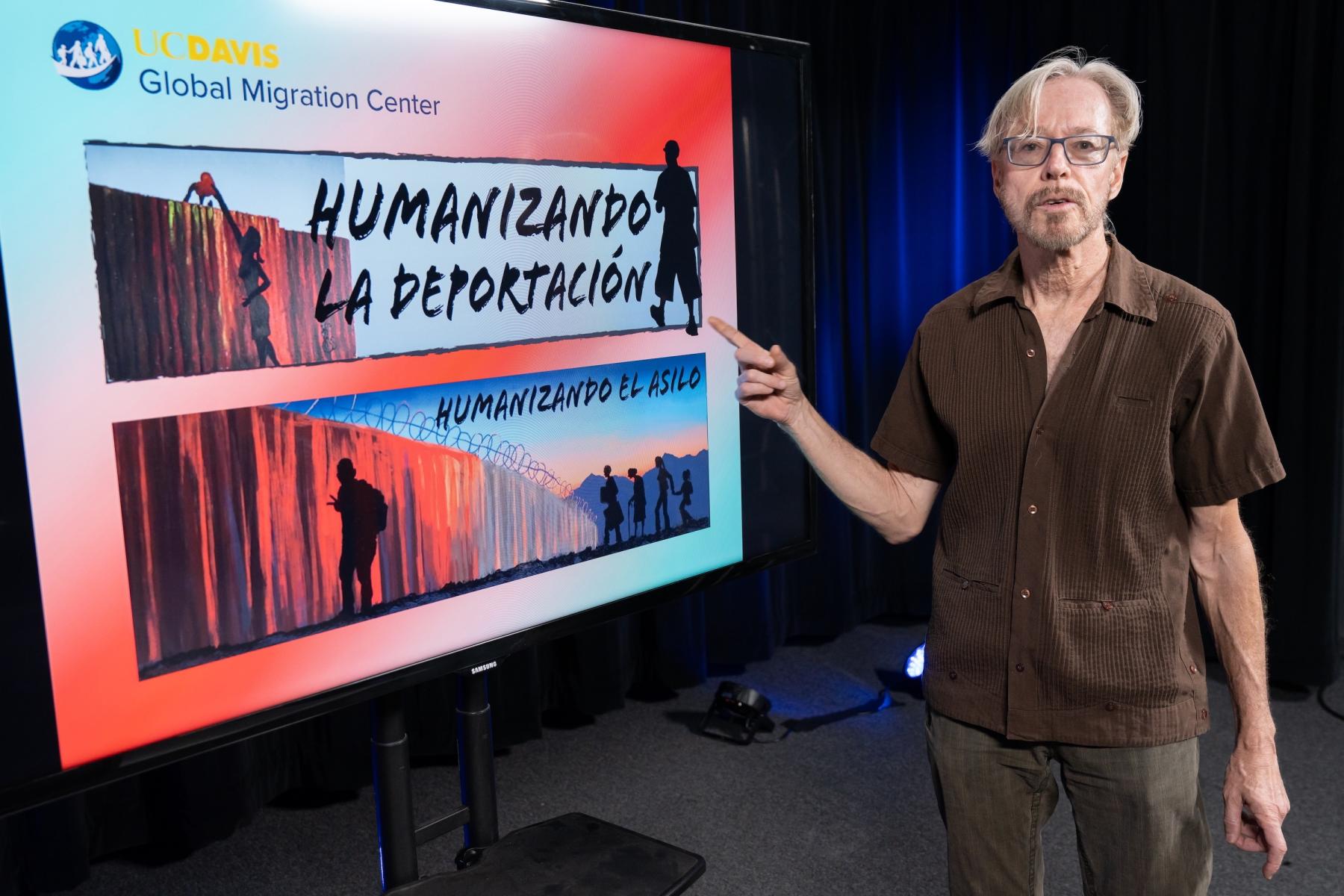
For the past decade the Humanizando la Deportación/el Asilo project has been recording stories of displaced persons (deported immigrants, asylum seekers, etc.), employing digital storytelling in order to document the repercussions of immigration laws, migration control policies and border enforcement practices on the lives of vulnerable migrants in the Central America-Mexico-US migration corridor. Its public online database currently holds the stories of well over 500 migrants recorded at the Tijuana border and other sites across the Americas. This presentation lays out the project's innovative method of participatory audiovisual production, and summarizes the different waves of human displacement and frequently shifting attempts at deterrence and interdiction that the project has documented over this period, emphasizing not only the precarity of migration in our times, but also the resilience of migrants to overcome obstacles and thrive in conditions of extreme adversity.
Robert McKee Irwin is Professor of Spanish and Deputy Director of the Global Migration Center at the University of California, Davis. Among his books: Mexican Masculinities, Diccionario de estudios culturales latinoamericanos (coeditor) and Listening to Sicarios (coauthor). Since 2016, he is Principal Investigator of the digital storytelling project Humanizando la Deportación/el Asilo with whose research teams he's published: Migrant Feelings, Migrant Knowledge: Building a Community Archive (editor), Humanizando la deportación: narrativas digitales desde las calles de Tijuana (coeditor) and, most recently, Movilidades en las Américas: entre regimenes de expulsión, políticas de contención e industrias de cuidado (coeditor).
Saturday April 18th, 2026
12:30 pm, Maier Room, Fromm Hall
Border Studies: Rethinking the Fourth Age of Migration.
Montassir Sakhi, UM6P-IAS; Wael Garnaoui, University of Sousse
The "fourth age of emigration" is examined in this intervention. This term is used to describe a period that emerged after 1995, when the Schengen Agreement between Europe and former colonial nations in the south of the Mediterranean was implemented. Wael Garnaoui and Montassir Sakhi argue that contemporary European visa and border regimes reproduce colonial logics of domination by regulating mobility and admitting labour selectively, while rendering other lives disposable. Focusing on migratory relations between Europe and the Maghreb and drawing on research with families of migrants who have died or disappeared at European borders, the paper analyses the social fractures, forms of domination and emerging resistance produced by this border regime. It places migration control at the heart of a global governance system that exacerbates structural inequalities between the Global North and South
Montassir Sakhi, anthropologist, Assistant Professor at University Mohammed VI Polytechnic (Chair of Transitions, Institute for Advanced Studies). His research focuses on mobilisations in the Arab world after 2011, repressive migration and security measures in Europe, and resistance among migrants and their families in Morocco and Tunisia.
Wael Garnaoui is a psychoanalyst and Assistant Professor at the University of Sousse (Higher School of Health Services). He is the coordinator of the Border Studies Research Group. His research focuses on the psychological effects of border regimes and processes of frontierization in the Mediterranean region, with particular attention to migration, trauma, and the impacts of visa regimes in Tunsia on mobility and subjectivity.
Tuesday April 21st, 2026
11:45 am, virtual event
After Border Externalization: Migration, Race, and Labour in Mauritania
Hassan Ould Moctar, School of Oriental and African Studies, University of London
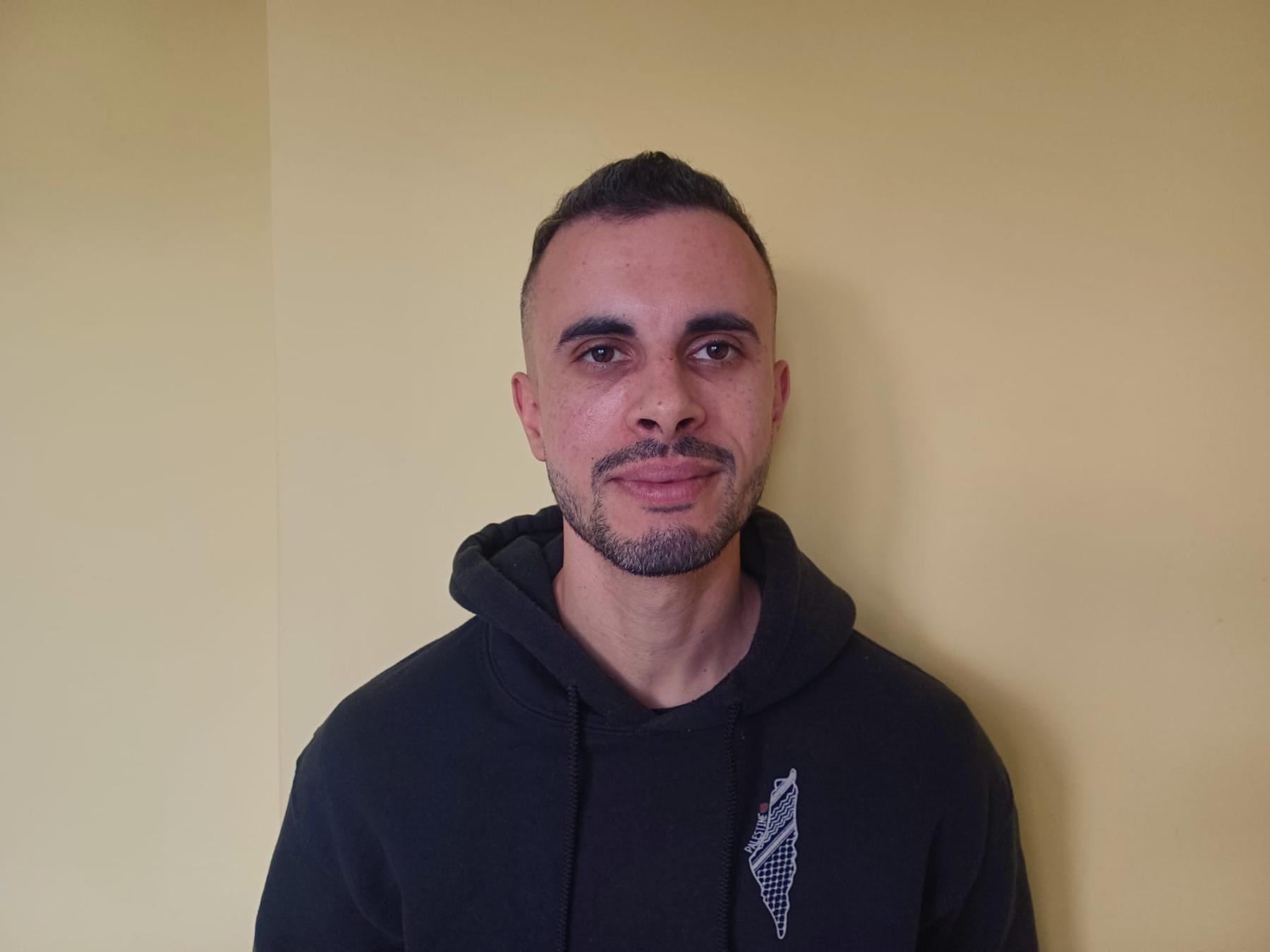
Across the world, rich countries are taking drastic measures to prevent onward migration at its perceived point of origin. After Border Externalization offers an original analysis of this process in the West African state of Mauritania. A concern with preventing “irregular migration” emerged relatively recently in the country as a result of European Union policy cooperation. But it intervenes within a deeper historic arc of colonial bordering and population management, while upholding capitalism’s tendency to cast people out of its development. To trace this in practice, the book offers fine-grained ethnographic accounts of the conditions of migrant workers who have come up against the violence of EU migration policy at various points in their trajectories. By tying these narratives to experiences of urban informality and rural dispossession, it demonstrates how the EU border regime upholds a colonial framework of racialized territorial belonging and contemporary capitalism’s dynamics in the Global South.
Hassan Ould Moctar is a Lecturer in the Department of Anthropology and Sociology at SOAS, University of London. Focusing on West Africa and the Sahara, his research bridges the fields of anthropology and development studies through the study of migration and borders. In particular, he is interested in how the contemporary illegalisation of migration interacts with the racial and territorial legacies of colonialism, uneven development processes, and conflict and displacement dynamics. He holds a PhD in Development Studies which he obtained from SOAS and has held teaching and research positions in SOAS and the LSE.
Tuesday April 28th, 2026
11:45 am, virtual event
Extractive Frontiers, Weaponised Terrains and Atmospheres of Surveillance. Rethinking the Border as Environment
Lorenzo Pezzani, University of Bologna
More info to come.
Tuesday May 5th, 2026
11:45 am, virtual event
Previous Events
Border Abolitionism as Decolonization in a World of Nation-States
by Nandita Sharma, University of Hawaii
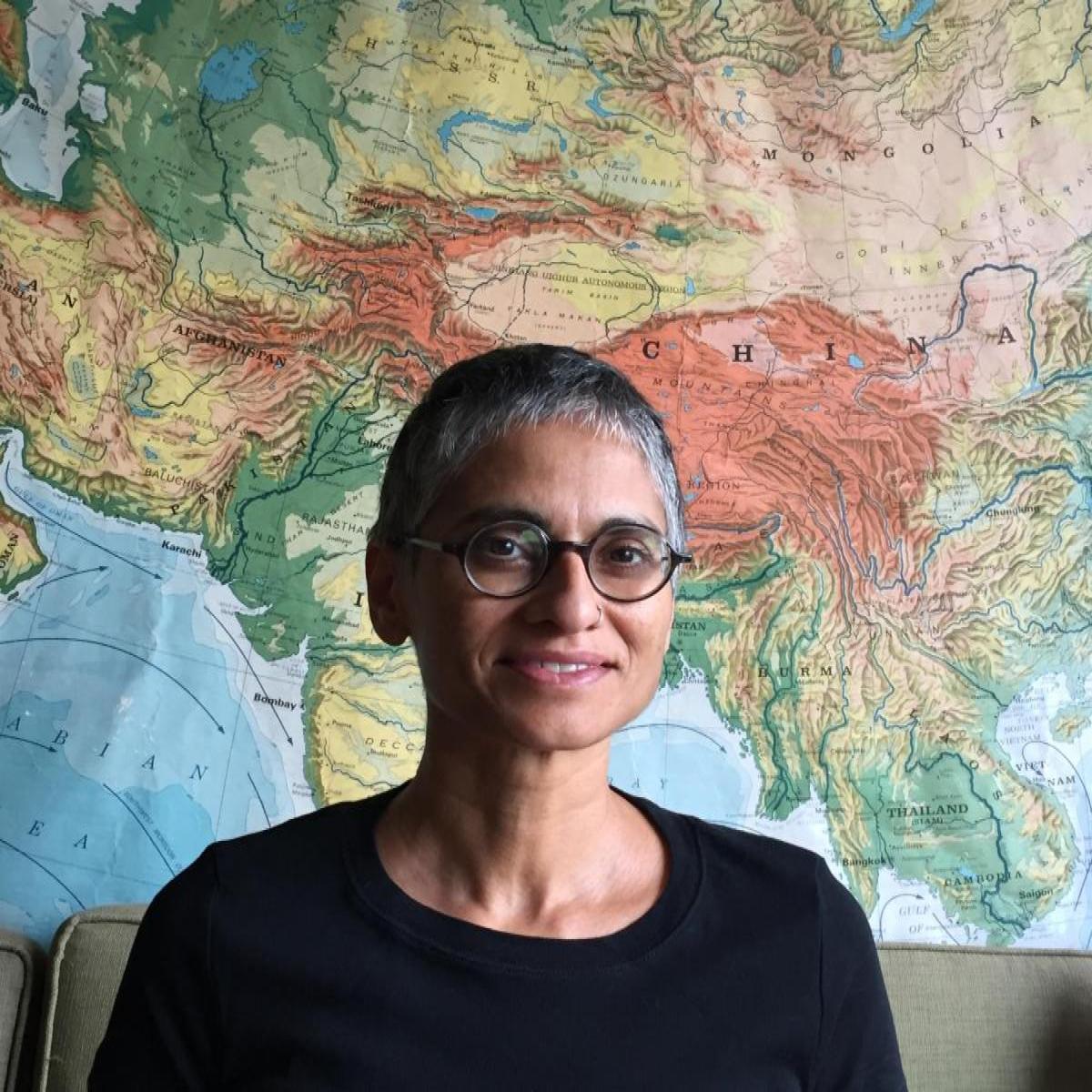
"Decolonization" has mainly come to be associated with the nationalization of state sovereignty. Yet, national sovereignty is also the legal and ideological basis for the regulation and restriction of people whose nationality does not correspond to that of the state. It is a crucial basis for the construction of the state category of "migrant." I trace the historical relationship between the ways states govern mobility and the form that state power takes, with an emphasis on how mobility regimes changed along with the shift in state sovereignty from imperial to national from the mid- to late-19th century and the hegemony of national sovereignty after World War Two. This shift marked a new intersection of technologies of domination with technologies of the self, making nationalism the governmentality of what I call the "postcolonial new world order." Uncannily, at the same time that nationalisms are everywhere intensifying, the "native," an imperial state category, has re-emerged as the center of nationalist politics. The figure of the "migrant," in turn, is increasingly decried as a "colonizer." I discuss such politics as well as those challenging them, with a focus on the politics of No Borders movements.
Nandita Sharma is Professor of Sociology at the University of Hawai‘i at Mānoa. She is an activist scholar and the author of Home Rule: National Sovereignty and the Separation of Natives and Migrants (Duke University Press, 2020) and Home Economics: Nationalism and the Making of ‘Migrant Workers’ in Canada (University of Toronto Press, 2006). She is currently co-editing three forthcoming volumes, Hydra Rising! The Ongoing Struggle for Freedom, Mobility and the Commons (with Bridget Anderson and Cynthia Wright, Duke University Press), Maritime Solidarities, Past and Present (with Marcus Rediker, Niklas Frykman, and Pepin Brandon), and Against Nations: A Manifesto for a Freer & More Equal World (with Steve Sacco).
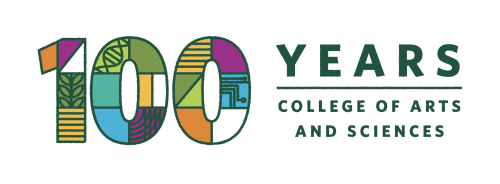
Previous Davies Forums
Davies Forum - Fall 2025
The current Davies seminar is being taught by Dr. Jim Williams, Professor, and Dr. Jalel Sager, Assistant Professor and Academic Director; both of the USF graduate program in Energy Systems Management.
"Fueling the Future: Energy and Economic Transitions"
Energy is both a fundamental pillar of American power, economy, and culture, and a politically charged issue. This course will introduce the Davies Scholars to today's battles over the need for, and means of achieving, a transition to a low-carbon economy as a means of stabilizing the planet's changing climate. It will help them understand how present struggles reflect a legacy of political divisions over energy reaching back many decade, and how the energy system of today emerged, sometimes violently, from that of the past.
Human-induced climate change is a civilizational challenge that will not be quickly solved. Students who wish to work in the energy field, or simply play a well-informed role in protecting the climate during their lifetimes, need a basic understanding of energy in all its dimensions: as a scientific and technological concept, driver of economic development, and as a reflection domestic and international power relations. This course will help the Davies scholars build an interdisciplinary foundation that allows them to engage with the global and U.S. transition to a low carbon energy system.
The goal of this course is to enable them to intelligently analyze and participate in the energy choices society now faces. This requires a firm grasp of the technical facts and history of the energy system, as well as philosophical reasoning that allows them approach questions such as "is a new ethical foundation required to make fundamental changes in the current energy system?"
Reflecting the deep political divisions of our time, the course will challenge each of the Davies Scholars to understand the U.S. as both a global leader in renewable energy and the world's largest oil and gas producer; that simultaneously values clean air, clean water, public goods, and equality of opportunity on the one hand, and that craves power and control--"energy dominance" in the current administration's language--on the other. Opportunities to reconcile these poles of our collective lives lie at the core of the course's investigations.
In addition to hearing from some of the country's leading scholars on the history, technology, and dynamics of the energy transition, the Davies Scholars will engage in solving a series of exciting mixed-methods problems that deliberates on critical issues in the current energy transition.
Events
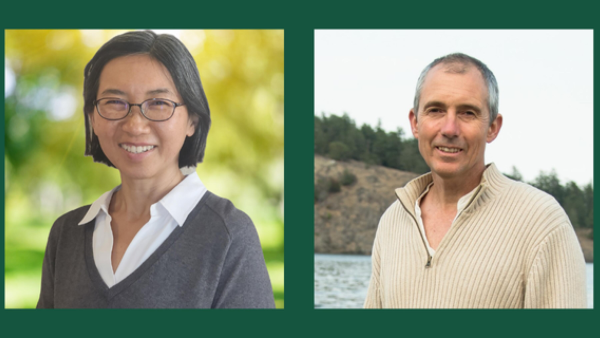
Please join the Davies Forum as we are in discussion with Chom and Chris Greacen, moderated by Professor Jim Williams. This discussion focuses on the experiences working to scale deployment of clean energy to underserved populations and enhance public participation and accountability in energy and climate decision-making. Chom and Chris' work spans four thematic areas: the creation of regulatory frameworks that harness private sector investment in village-scale energy solutions in Sub-Saharan Africa, democratizing power sector planning in Thailand; assistance to Karen ethnic minority groups in the civil-war-torn jungles of Myanmar to develop people-centered energy policy and deploy distributed energy for medical clinics and homes; and development of novel mechanisms for community engagement in county-level climate planning in the Pacific Northwest. Much of the talk will explore territory and interactions between institutions of (electric) power and scrappy idealism.
A bit about out Guests:
Chuenchom Sangarasri Greacen is an independent energy researcher/analyst. She conducts public interest research and policy advocacy toward fair, sustainable and democratic development of the energy sector in Thailand and the Mekong Region. She is currently based in Lopez Island, where she serves on the board of the Madrona Institute which works to promote climate resilience and community engagement around climate planning in San Juan County, Washington State. She worked for the Energy and Planning Office, Ministry of Energy, Thailand and co-founded a Thai NGO Palang Thai. She has a master’s degree from the Energy Resources Group at University of California, Berkeley.
Chris Greacen works on policy and hands-on implementation of renewable energy projects from the village to the national level. He has worked on rural renewable electricity projects or policies in over 20 countries including Haiti, Liberia, Nepal, Nigeria, North Korea, and Tanzania. He helped Thailand develop the region’s first regulations supporting grid-connected renewable energy, now accounting for over 5 GW of small grid-connected renewables. Since 2007 he has worked as consultant to the World Bank’s ESMAP, developing country programs and regulatory frameworks for mini grids in countries in Sub Saharan Africa and Southeast Asia. He holds a Ph.D. in Energy and Resources from UC Berkeley. He lives on Lopez Island, Washington where he serves on the San Juan County Climate and Sustainability citizens advisory committee.
Public Utility and the Decarbonization Challenge
with Professor William Boyd
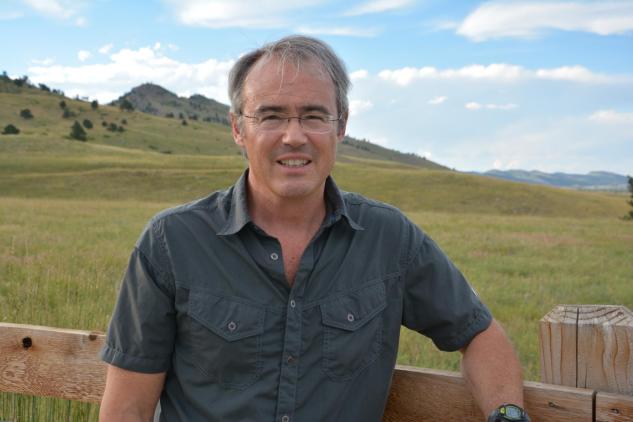
Please join the Davies Forum for talk with William Boyd, Professor of Law at UCLA, Michael J. Klein Chair in Law, and Faculty co-director of the Emmett Institute on Climate Change & the Environment, as he argues that a revitalized and expanded notion of public utility has a critical role to play in decarbonizing the power sector and electrifying much of the rest of the economy. While many contemporary critics view the concept of public utility as an outdated relic of a bygone era that put too much faith in government control and the fuzzy notion of public interest, this talk seeks to recover a broader, normative concept of public utility that has long stood as a distinctively American approach to the social control of business—a third way between unregulated markets and outright public ownership that promised to harness power of private enterprise and direct it toward public ends. Notwithstanding the challenges involved in the actual practice of public utility regulation, the talk shows how a more expansive notion of public utility provides can provide a foundation for efforts to govern a power system that is increasingly complex, participatory, and intelligent, and for managing the sustained collective effort to channel investment and behavior in a manner necessary to realize a low-carbon future.

Please join the Davies forum as we welcome Julia Olson, Founder, Co-Executive Director, and Chief Legal Counsel at Our Children’s Trust. Julia will discuss why the climate crisis is a children’s rights issue and how youth are leading groundbreaking litigation to secure their inalienable rights to life and liberty. Julia will discuss the recent historic hearing in Missoula, Montana in Lighthiser v. Trump—a federal right-to-life case challenging three executive orders to “unleash” fossil fuels, block clean energy development, and suppress climate science. This hearing marked the first time in U.S. history that youth plaintiffs in a constitutional climate case presented live testimony in federal court about harms like wildfire evacuations, heat strokes, and mental health trauma. The court recognized plaintiffs’ injuries and called the crisis a “children’s health emergency”, but dismissed the case on jurisdictional grounds. Julia will explain why this case is far from over and how a series of cases starting with Juliana v. U.S. represent a critical legal movement for intergenerational justice. She will also highlight landmark state cases such as Held v. Montana, the first children’s constitutional climate trial in the U.S., and Navahine v. Hawai‘i Department of Transportation, which secured the first settlement in a youth-led constitutional climate case targeting transportation emissions and speak to the work being done at the state level to enforce children’s fundamental rights to grow up healthy and safe.
Davies Forum - Spring 2025
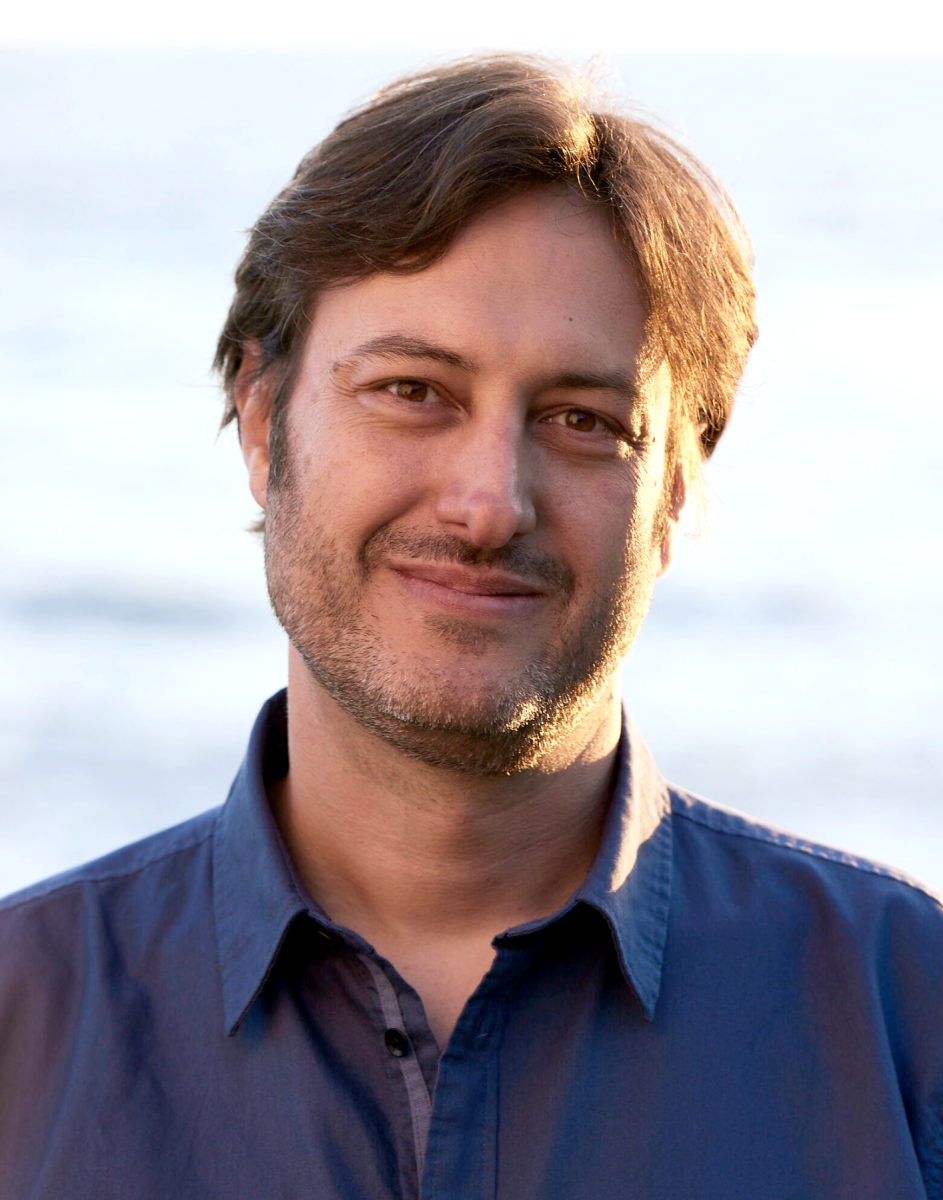
Please join us on April 16th, 2025 as Daniel Barcay, the Executive Director of the Centre for Human Technology talks to us about "Steering Towards a More Humane Future with Artificial Intelligence". His career in the technology sector focused on developing planetary scale systems, including Google Earth. Today, he is advocating for human thriving within the rapidly developing landscape of artificial intelligence.
April 16th, 2025, 4:45 - 6:15 pm
McLaren 251
Refreshments will be provided.
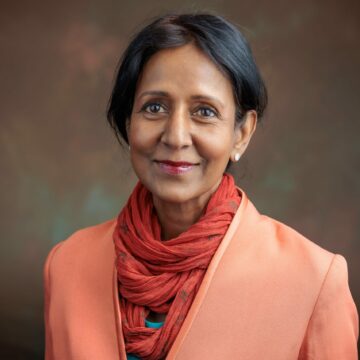
Please join us on March 26th as renowned legal expert Jothie Rajah discusses how authoritarian powers are slowly breaking down the primary elements of international law.
Dr. Jothie Rajah, Researcher at the American Bar Foundation
March 26th, 2025 4:45 - 6:15 pm
Fromm 125, Maraschi room
Refreshments will be provided.
"Political Creativity of the Far Right" by Joseph Lowndes
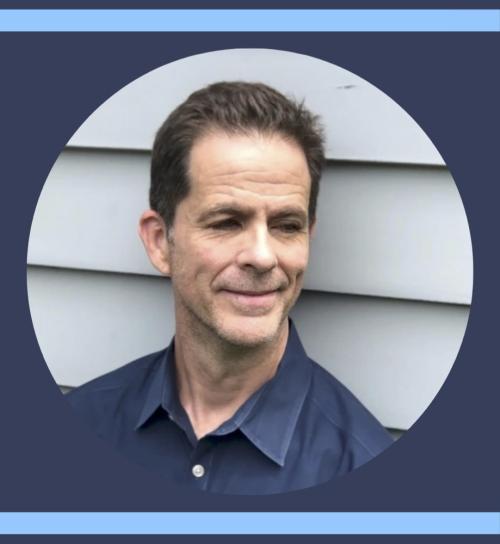
Join us and Joseph Lowndes (CUNY-Hunter College) as he discusses his forthcoming book, Adventures in Post-Democracy (UC Press). In this book, Lowndes shares his experience of doing ethnographic research on right-wing movements over the past fifteen years. He is also the author of From the New Deal to the New Right: Race and the Southern Origins of Modern Conservatism (Yale University Press), and co-author with Daniel Martinez HoSang of Producers, Parasites, Patriots: Race and the New Right-Wing Politics of Precarity (University of Minnesota Press).
We will be meeting in McLaren 251 on February 19th, 2025 from 4:45 - 6:45 pm.
The Fall 2024 Davies Forum focused on "Birth Justice and the Crisis in Maternal Health Care", taught by Dr. Chinyere Oparah, Professor of Race and Gender Studies.
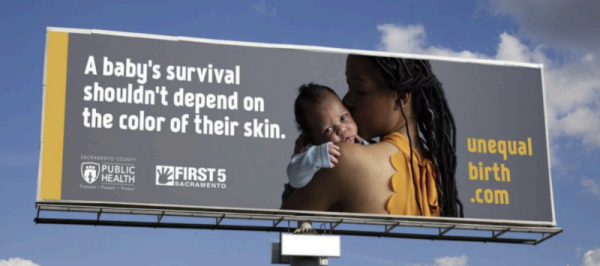
A little about the course:
The crisis in Black maternal health care in the U.S. rose to national attention during the past decade, due in large part to the emergence of a national political movement led by Black women and shaped by grassroots organizing. High profile preventable deaths of new mothers such as Sha-Asia Washington and Amber Rose Isaacs brought attention to deep inequities in maternal outcomes, with CDC data showing Black maternal morbidity of three times that of white women, and some districts reporting discrepancies of up to 12 times. Black birthing persons are also more likely to experience life-threatening pregnancy complications including preeclampsia, postpartum hemorrhage and blood clots. Their infants are more likely to experience preterm birth, low birth weight and are twice as likely to perish before their first birthday. These data demonstrate stark inequities in health outcomes, but fail to humanize the crisis. Community-based research that focuses on Black pregnant persons’ lived experiences shows that coercion, neglect and intersectional racism by physicians are equally important aspects of the crisis.
Birth Justice and the Maternal Health Care Crisis is an interdisciplinary course that exposes students to methodologies and lines of inquiry from several disciplines in order to better understand the root causes and lived experiences of the maternal health crisis. The course is framed by Africana studies and women’s & gender studies perspectives, and Black feminist scholarship in particular. In this context, intersectional feminism and reproductive justice will be utilized as interconnected theoretical frameworks, encouraging students to move beyond binary forms of thinking (black/white, male/female), and to examine the complex and nuanced ways in which race, gender, sexuality, citizenship and other systems of dominance shape pregnancy and childbirth experiences.
In keeping with the apostolic preference for walking with the excluded, this course brings students into dialogue with health care practitioners, birth justice activists and Black mamas through a lens of cultural humility. Students are invited to partner with One Love, Black Community, who meet every second Sunday to package and distribute essentials to new mamas in the Bayview district. We will also visit Black Centering at SF General Hospital and learn about their work with Black pregnant people. In addition, students will have the opportunity to assist in hosting the Davies Seminar speaker series, featuring scholars and activists who are making critical interventions in the field of Black maternal health.
EVENTS
Previous Events
Transnationalizing the Movement for Birth Justice
Thursday, October 17, 2024
4-5:30 pm PT, 7-8:30 pm ET
Virtual Event
Join us for a discussion with birth justice advocates and scholar Dána-Ain Davis and national thought-leader and community organizer Joia Crear Perry.
In the past decade, a vibrant movement has emerged in the U.S. and Canada to demand justice for Black birthing people and their infants. Fueled by stark inequities in birth outcomes for BIPOC pregnant people, the movement has made significant strides, from new legislation to the creation of programs and initiatives to improve birth experiences and outcomes in BIPOC communities. In this conversation with reproductive justice scholar-activist Dana Ain-Davis and physician-advocate Joia Crear Perry, we will learn about the power of transnational alliances with advocates in Africa and Latin America, and explore how we can dismantle obstacles to active solidarity with pregnant people beyond U.S. borders.
Dána-Ain Davis is Professor of Urban Studies and Anthropology. She is the director of the Center for the Study of Women and Society at the Graduate Center. In the last decade, Davis has focused her attention on reproduction, race, and the technologies that assist in reproduction. She is the author, co-author, or co-editor of five books, the most recent being Reproductive Injustice: Racism, Pregnancy, and Premature Birth. Reproductive Injustice received the 2020 Honorable Mention for the Victor Turner Prize in Ethnographic Writing; was a finalist for the 2020 PROSE AWARD, given by the Association of American Publishers; and is listed as one of seven books on anti-racism in New York Magazine. Her recent article Uneven reproduction: Gender, race, class, and birth outcomes builds on the concept of uneven development to understand the persistence of adverse reproductive outcomes among Black women compared to White women in transnational contexts.
Dr. Joia Crear-Perry is a physician, policy expert, thought leader and advocate for transformational justice. As the founder of the National Birth Equity Collaborative (NBEC), she identifies and challenges racism as a root cause of health inequities. She is a highly sought-after trainer and speaker who has been featured in national and international publications including Essence and Ms. Magazine. In 2020, Dr. Crear-Perry was honored by USA Today in its "Women of the Century" series and featured on ABC Nightline’s Hear Her Voice.
Embodied Abolitionism: Reproductive Justice Beyond the Prison-Industrial Complex
Thursday, October 3, 2024
5:30-7 pm
Fromm 115
Food will be provided
Join us for a discussion with abolitionist and community organizer Tanisha Cannon, and law professor Priscilla Ocen.
As mass incarceration has exploded in the U.S. over the past quarter century, more and more people have found themselves imprisoned while pregnant or during their childbearing years. Reproductive injustices run rampant behind bars, from the mass sterilization of Black and Latinx women in California prisons, to the denial of care to birthing people in prisons and jails. In this conversation between abolitionist organizer Tanisha Cannon and law professor Priscilla Ocen, we will explore how a birth justice lens deepens our understandings of freedom and bondage, and what we can do to demand and achieve justice for criminal-legal system involved pregnant people.
Dr. Tanisha Cannon is a dedicated and compassionate advocate for social justice, committed to making a lasting impact on the lives of prisoners and their children. As the Managing Director of Legal Services for Prisoners with Children, she organizes communities impacted by the criminal justice system and advocates to release incarcerated people, to restore human and civil rights, and to reunify families and communities. Dr. Cannon’s passion for creating positive change stems from her personal experiences. Having witnessed firsthand the effects of the criminal justice system on her own family, with her mother, brothers, and grandfather all experiencing incarceration, she is deeply committed to challenging the status quo. As a juvenile, she also faced direct impacts from the system, giving her a unique perspective and a sense of urgency to work towards systemic reform.
Priscilla A. Ocen is an associate professor of law at Loyola Law School. Her work examines the relationship between race and gender identities and punishment. In particular, her scholarship explores conditions of confinement within women’s prisons and the race and gender implications of the use of practices such as shackling during labor and childbirth. Her work has appeared in academic journals such as the California Law Review, the UCLA Law Review, and the Du Bois Review, as well as in popular media outlets such as Ebony and Al Jazeera.
Birthing Justice: Film Screening and Book discussion
Thursday, September 12, 2024
5:30-7:30pm
McLaren 252
Food will be provided
Join us for a film screening followed by Q&A with Executive Producer Denise Pines and Black Women Birthing Justice co-founder, Chinyere Oparah.
Film Description: This is a story of Birthing, ... of Life... of Justice
Black women in the United States are three to 4 times more likely to die during childbirth than white women. BIRTHING JUSTICE, a feature-length documentary film, captures the experiences and challenges of Black women, their families, caretakers, and advocates, and examines the structures and systems that determine disparate rates of mortality. Ultimately, this pivotal film celebrates the efforts to fix America’s broken medical system and transform this narrative of tragedy into one of hope. See them. Hear their stories. Remember and honor those we have lost. And join the movement to ensure BIRTHING JUSTICE for Black mothers and their families.
Denise Pines is the Executive Producer and Co-Writer of Birthing Justice, the film. CEO, author, speaker, filmmaker, and health advocate, Pines is a media pioneer, award-winning marketer, serial entrepreneur, and community health advocate. She served more than 14 years as a creative consultant for talk television and radio shows (PBS/NPR) and 11 social justice documentaries. As co-founder of Women in the Room Productions, she is committed to diversity in front and behind the screen.
Chinyere Oparah has published extensively on black maternal health, decarceral politics, research justice, and transnational black feminisms. She is the co-founder of Black Women Birthing and co-author of Birthing Justice: Black Women, Pregnancy, and Childbirth, a seminal text that puts black women at the center of debates about the crisis in maternal health care. She is lead author of Battling Over Birth, a human rights report that challenges existing research paradigms used to investigate black women's perinatal health, using a research justice framework. She has also written articles on Black birthworkers, birth experiences, and the COVID-19 pandemic.
Birthing a New Planetary Consciousness: Black Feminists in Conversation
Thursday, November 7, 2024
5:00-6:30 pm
Virtual Event: Zoom
Join us to celebrate the launch of Alexis Pauline Gumbs new biography of Audre Lorde, Survival is a Promise: The Eternal Life of Audre Lorde. Julia Chinyere Oparah and Dr Gumbs will reflect on their involvement in the movement for Birth Justice, and then move outward to explore all the many struggles and consciousness shifts that we need to birth in order to achieve liberation. The event will culminate with a discussion of what we can learn from Black feminist poet and visionary Audre Lorde in this moment, and a short reading from Survival is a Promise. Lorde’s understanding of survival was not simply about getting through to the other side of oppression or being resilient in the face of cancer. It was about the total stakes of what it means to be in relationship with a planet in transformation. For her, ecological images are not simply metaphors but rather literal guides to how to be of earth on earth, and how to survive—to live the ethics that a Black feminist lesbian warrior poetics demands.
Spring 2024
This Spring's Davies Forum, Reframing Wokism in an Era of Anti-Itellectualism, will be taught by Dr. Brandi Lawless, Professor of Communication Studies. A little bit about the course:
The goal of this course is to better understand the broad discourses of (anti)wokism and anti-intellectualism in the U.S. A number of local, state, and national politicians are making “anti-wokism” part of their political platform. It’s easy to be reactive, protest, or even protect ourselves in our bubble. It’s more difficult to analyze the arguments that are being developed and speak back to them in constructive dialogic ways. Rather than be purely reactive to such policies, this course takes a communication approach to reframe discourse and shift narratives away from reactivity toward connection. In essence, the trajectory of the course is: Understand→Relate→Reframe→
Previous Events
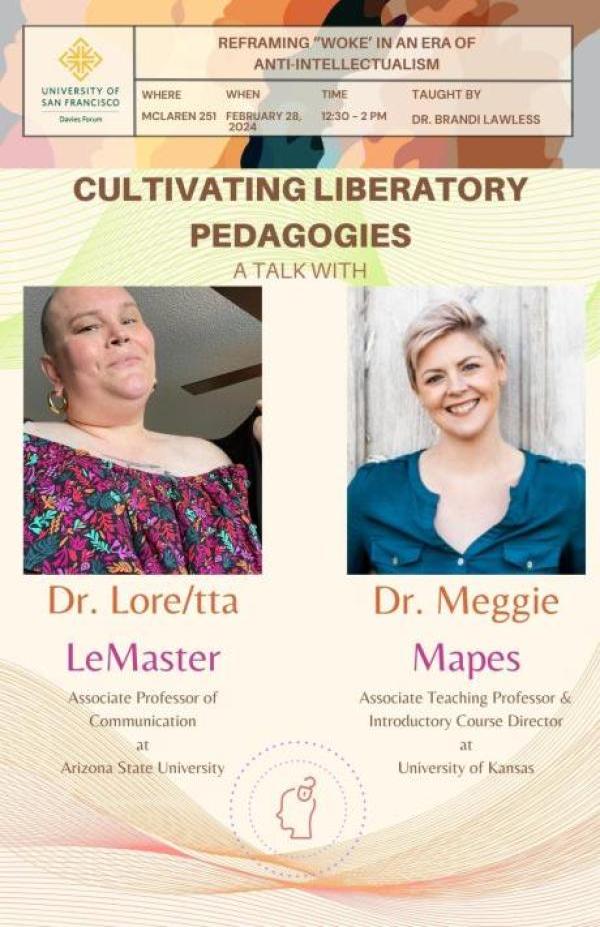
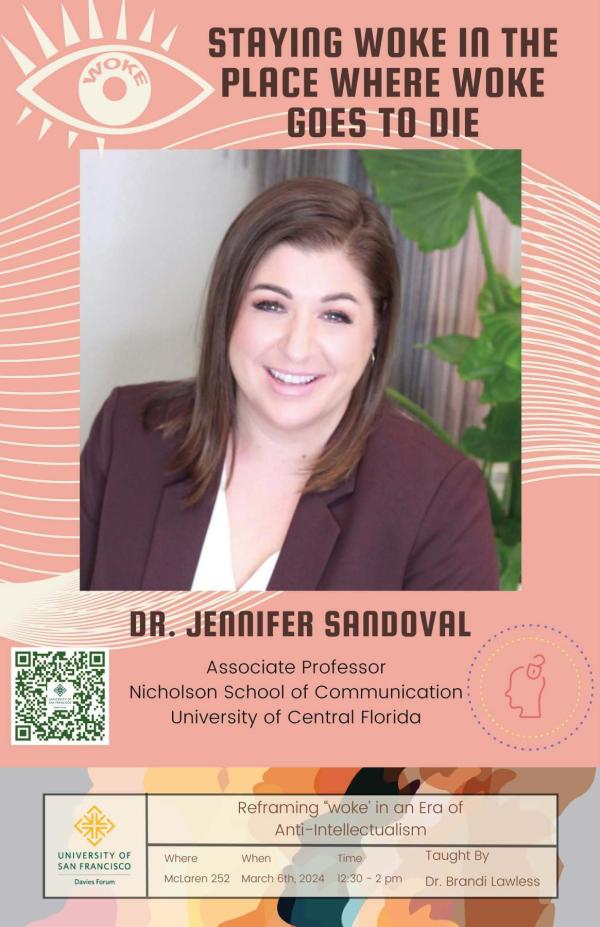
Dr. Jennifer Sandoval gave her talk, "Staying Woke in the Place Where Woke Goes to Die". Hailing from Orlando, Florida, Dr. Sandoval is an Associate Professor in Communication at the University of Central Florida.
“All I Need to Know About Political Conflict, I Learned from The Wizard of Oz”
A Talk by Dr. Tania Israel
Roiled by social media algorithms, provocative news, and clashing politicians, Americans are experiencing increased stress and interpersonal conflict. Appeals to elected officials, demands for media reform, and calls for “the other side” to change their tactics reveal frustration and paralyzing disempowerment. Drawing on a familiar and imaginative narrative, Dr. Israel takes her audience on a journey down the yellow brick road to help them navigate the challenges of living in politically polarized times. Attendees will gain knowledge, skills, and motivation to strengthen their individual capacity and perhaps even to repair our ruptured country.
Please join us on April 17th, 2024 from 12:30 - 2 pm in McLaren 251.
There will be food!
"More in Common's Research on America's Hidden Tribes, Perception Gaps, and Social Connection"
A talk with Dr. Ashley Fabrizio
Join the Davies Forum as Dr. Fabrizio, political scientist and Senior Researcher at More in Common, discusses how our core beliefs affect our political opinions, what we misunderstand about each other's political opinions, and how we still want to connect despite our differences.
A bit more about More in Common:
Established in 2017, More in Common's mission is to build societies that are stronger, more united, and more resilient to increasing threats of polarization and social division. More in Common is a 501(c)(3) that works with hundreds of organizations and leaders in civil society, business, faith, education, and philanthropy to connect people across lines of division. More in Common disrupts polarizing narratives through unique, core beliefs research; it also builds civil society capacity by growing and serving the field to strengthen social cohesion and democracy.
No Place Like Home: Geographies of Belonging & Housing Justice
Rachel Brahinsky, Associate Professor, Urban and Public Affairs
The housing crisis, once largely imagined to be confined to places like the Bay Area and New York City, is widespread. People in all major cities and most minor ones currently face the most housing-insecure environment we’ve seen in decades. This course poses that this is not just a socio-economic concern, but a deeper one that can be understood through the lenses of belonging and home, following scholar Bell Hooks who wrote about “belonging” as specifically rooted in a holistic connection to place, with individual and community identity implications. This course, therefore, poses and fuses two major ways of thinking about housing. We will examine the housing problem as a material. For example, how does housing get built, and how do we collectively decide who lives where? We will also look at housing as a theoretical/ conceptual problem. How, for example, does access to safe and decent housing shape our sense of place and sense of connection to the community? Fundamentally, we will ask: How would a city (or a society) that truly values belonging and inclusion approach the housing question? Although the class will be grounded in US case studies, student research projects can span the globe.
Wendy Cheng
View the Recording of What Having a House Represented
Wendy Cheng is a Professor of American Studies at Scripps College, chair of the Intercollegiate American Studies Program, and core faculty in the Intercollegiate Department of Asian American Studies at the Claremont Colleges. She is the author of The Changs Next Door to the Díazes: Remapping Race in Suburban California (University of Minnesota Press, 2013), which won the 2014 Book Award from the American Sociological Association’s Section on Asia and Asian America, and Island X: Taiwanese Student Migrants, Campus Spies, and Cold War Activism (forthcoming from University of Washington Press). Her coauthored book, A People’s Guide to Los Angeles (with Laura Pulido and Laura Barraclough; University of California Press, 2012), won the Association of American Geographers’ Globe Book Award for Public Understanding of Geography and the SCIBA Nonfiction Award. Cheng’s articles, essays, and creative nonfiction have been published in American Quarterly, Amerasia Journal, Boom: A Journal of California, and the Los Angeles Review of Books, among other publications.
Housing Panel on Housing and Homelessness
Please join us as local leaders discuss policy on housing, homelessness, housing justice, and belonging. It features the Executive Director for the San Francisco Coalition on Homelessness, Jennifer Friedenbach, the Executive Director for the Housing Rights Committee, Fred Sherburn Zimmer, and the Community Organizer and Staff Writer at People Power Media, Jeantelle Labertino. This is one of the many events being hosted by the Davies Forum called, No Place Like Home: Geographies of Belonging and Housing Justice by Professor Rachel Brahinsky.
Angola Prison, Black Ecologies, & the Rise of Eco-fascism in Louisiana
Justin Hosbey is a humanistic social scientist and Black studies scholar. His ethnographic work explores Black social and cultural life in the U.S. Gulf Coast and Mississippi Delta regions, focusing on the ways that southern Black communities articulate modes of citizenship that demand the interruption of racial capitalism and ecocide. His current ethnographic project utilizes digital and spatial humanities research methods to understand and visualize how the post-Katrina privatization of neighborhood schools in low-income and working-class Black communities has fractured, but not broken, space and placemaking in Black New Orleans.
Housing the Third Reconstruction: Property and Its Insurgencies
View the Recording of Housing the Third Reconstruction
Ananya Roy talked with us about urban transformations and land grabs as well as global capital and predatory financialization. Her ongoing research, focused on Los Angeles, is concerned with “racial banishment,” the expulsion of working-class communities of color from cities through racialized policing and other forms of dispossession.
No One Left Behind – The Meaning of the Human Right to Housing
View the recording of No One Left Behind
Lynn Lewis spoke to us about their works with the intersection of community organizing, oral history, and popular education. In each of these areas, her focus is on supporting organizing by homeless and poor folks. She is the former Executive Director and civil rights organizer of Picture the Homeless (PTH). Working at PTH for 17 years, she helped develop PTH’s organizing methodology, including integrating participatory action research into PTH's organizing campaigns including organizing to end the criminalization of homeless folks as well as developing solutions to the housing crisis, including community land trusts and large-scale cooperative housing.
Spring 2023
Planetary Feminist Activism: Confronting Crisis through Collective Strategies
Taught by Elisabeth Jay Friedman and Dorothy Kidd
It can seem nearly impossible, and certainly daunting, to address the multiple crises deepening
inequalities around the globe. While it is important to analyze these deep systemic inequalities, and how they will gravely impact our communities and our planet for years to come, this Davies Forum starts with a much more proactive premise. We feature the ways that women and gender non-conforming people around the world have collectively responded to not only the pandemic and other grave emergencies but also the unjust systems they reveal. By reclaiming and redesigning a wide panoply of organizational forms, art, communications, and media tools, these community leaders have built and augmented connections and diffused practical information to articulate and enact visions of planetary justice that address our contemporary realities.
Events
Lisa E. Bloom
Author of Climate Change and the New Polar Aesthetics: Artists Re-image the Arctic and Antarctic
We will be hosting Lisa for a book talk on April 11th from 3:00 - 4:25 pm in McLaren 252 with a reception to follow in Thacher Gallery from 4:30 - 6:00 pm.
In Climate Change and the New Polar Aesthetics, Lisa E. Bloom considers the ways artists, filmmakers, and activists engaged with the Arctic and Antarctic represent our current environmental crises and reconstruct public understandings of them. Bloom engages feminist, Black, Indigenous, and non-Western perspectives to address the exigencies of the experience of the Anthropocene and its attendant Necosystem failures, rising sea levels, and climate-led migrations. As opposed to mainstream media depictions of climate change that feature apocalyptic spectacles of distant melting ice and desperate polar bears, artists such as Katja Aglert, Subhankar Banerjee, Joyce Campbell, Judit Hersko, Roni Horn, Isaac Julien, Zacharias Kunuk, Connie Samaras, and activist art collectives take a more complex poetic and political approach. In their films and visual and conceptual art, these artists link climate change to its social roots in colonialism and capitalism while challenging the suppression of information about environmental destruction and critiquing Western art institutions for their complicity. Bloom’s examination and contextualization of new polar aesthetics make environmental degradation more legible while demonstrating that our own political agency is central to imagining and constructing a better world.
For more on her work see her website: www.lisaebloom.com
Sasha Costanza-CHOCk
Oracle for Transfeminist Technologies Workshop (w/ Coding Rights)
When: March 28th, 2023 from 2:40 - 4:25 pm in LM 245
Throughout history, human beings have used divination procedures (such as Tarot decks) to help understand and reshape the future. In this workshop, participants will learn about what an intersectional transfeminist lens can bring to the discussion about AI; engage in a speculative design exercise; generate ideas for new technologies; and discuss how to partner with community-based organizations to design new technologies.
Dr. Sasha Costanza-chock will also be speaking later in the evening
Join us for an event where Dr. Sasha Costanza-Chock speaks to us about Community-led Practices to Build the Worlds We Need.
Fromm Hall, Berman Room from 7 - 8:30 pm.
Fall 2022 Davies Forum
Fall 2022 Davies Forum Seminar Series:
- Thursday, August 25th, 2022 7-8:30pm: Dr. Angus Fletcher, Professor of Story Science at Ohio State’s Project Narrative, joins Davies Forum instructor Dr. Indre Viskontas in a conversation about The New Neuroscience of Literature: How Poems, Novels, and Films Boost Creativity, Courage, and Resilience.
- Thursday, September 22nd, 2022 7-8:30pm: Dr. Thalia Goldstein, from George Mason University, will discuss her work on the effectiveness of theatre as a way of teaching children morality and empathy, how children think about moral issues at the fiction-reality boundary, and how young children and adults understand and react to watching fictional worlds as audience members.
- Thursday, October 6th, 2022 7-8:30pm: Earlonne Woods and Nigel Poor, hosts of the popular Ear Hustle podcast, join Dr. Viskontas in conversation about giving voice to those who have been silenced by society. Ear Hustle launched in 2017 as the first podcast created and produced in prison, featuring stories of the daily realities of life inside California’s San Quentin State Prison, shared by those living it. Co-founded by Bay Area artist Nigel Poor alongside Earlonne Woods and Antwan Williams — who were incarcerated at the time — the podcast now tells stories from inside prison and from the outside, post-incarceration.
- Thursday, November 3rd, 2022 7-8:30pm: Dr. Sue Savage-Rumbaugh, psychologist and primatologist, will talk about her work as the first scientist to conduct language research with bonobos. Recognized by Time Magazine as one of the 100 Most Influential People in the World, her wholistic approach to language immersion with apes speaks to the communication abilities that we share with our closest relatives in the animal kingdom. Her current work involves exploring music-making as a way of connecting with the bonobos.
More about the course:
Fire enabled our ancestors to cook food and spend less time seeking sustenance and more time building civilizations. By some, it’s considered the tool that paved the way for the expansion of the human brain, as we were better able to fuel our most metabolically-costly organ, and free up time to gather together. But the invention of stories arguably allowed us to pass on the gains we made from one generation to the next, to share experiences and thoughts, to imagine the consequences of our actions. Literature is a technology just like any other, though perhaps even more powerful than anything else the human mind has brought into existence. When it comes to using stories to facilitate societal change, one modern framework stands out, and dovetails beautifully with the pillars of story science: the Public Narrative. This framework divides effective storytelling into three parts the Story of Self, the Story of Us and the Story of Now. These three parts effectively map onto story science, and provide a scaffold with which we can investigate how our brains create and respond to stories.
In this course, we will examine storytelling through the lens of neuroscience and explore the role it plays in building our identities (self), our social groups (us) and understanding our environment (now). As our society reckons with how marginalized groups have been silenced or ignored throughout history, understanding the power of stories and how they are told effectively to change society could not be more relevant. This course aims to further this understanding by surveying the neuroscience of stories and integrate this knowledge with the Public Narrative framework, so that students can utilize what they learned to effectively further the public good and their own values.
Spring 2022 Davies Forum Seminar Series:
- "Restorative Justice & The Environment: The Future is Indigenous Rematriation" with Corrina Gould
March 22, 2022
7:00 PM-8:30 PM
View the recording of Restorative Justice and the Environment
**Please note, due to technical difficulties, the recording of "Restorative Justice and the Environment" begins approximately 5 minutes into the speaker's talk. We apologize for any inconvenience.** - "Radical Redistribution: Reparations for the Black Descendants of Enslaved Africans" with Dr. Cornel West
February 23, 2022
7:00 PM-8:30 PM - "Genocide and Reconciliation: Native Americans and a Potential Path toward Restorative Justice" with David Treuer
February 1, 2022
7:00 PM-8:30 PM
View the recording of Genocide and Reconciliation
Forgiving the Unforgivable: The United States, Slavery, and Genocide
Taught by Aaron J. Hahn Tapper, Swig Program in Jewish Studies and Social Justice
Humans make mistakes. We do things that we shouldn’t do. The question is not whether or not this will happen; rather, how should we deal with these regular occurrences after the fact? Because humans are social creatures, and interacting with others is part of normal lives, forgiveness and apologies are central to the human experience. They are a component of one’s relationship with other individuals, other collectives, and even oneself.
But what does forgiveness mean? When someone forgives another person, what happens? And what happens when one group of people does something wrong to another group? What about if something heinous—perhaps best framed as something unforgivable—happens? In the twentieth and twenty-first centuries, these questions are not merely theoretical; they aren’t thoughts limited to the ivory tower.
This course grapples with some of the most important elements of being a human (i.e., determining the best way/s to move through mistakes, even those that might be called indefensible) and a member of U.S. society (i.e., confronting the systemic legacy of both slavery and Indigenous genocide). Creating a context for students to learn about foundational questions at the core of their twenty-first-century identities, students will find that the structure and content of this course is relevant to themselves personally as well as to their student selves attending a university on “American soil.”
Spring 2021 Davies Forum
Making Sense of a Post-Western World: Interdisciplinary Tools, Global Perspectives
Taught by Nora Fisher Onar, International Studies
The United States and Europe—in many ways, epicenters of the COVID-19 pandemic—may emerge diminished in their global leadership role(s). This outcome, in tandem with political turmoil in the United States, arguably has accelerated a structural trend underway for at least a decade, the eclipse of Western primacy in world affairs. To make sense of our nascent post-Western order, students will develop a toolkit drawn from “global International Relations”: an interdisciplinary approach to world affairs which foregrounds traditionally marginalized perspectives on outstanding economic, social and security challenges. We will ask if, why, and how the United States-led West is in decline, and seek to understand what this process—and our persistent common challenges as humanity—look like from Asia, Africa and Latin America. The course, as such, speaks to anxieties about the West’s relative decline. But rather than respond with economic and cultural nationalism (atavistic energies which have been exacerbated by today’s pandemic), the seminar explores how our present crisis and the post-Western world it augurs offer not only challenges, but also opportunities to build a more equitable global community. Our inquiry, as such, will be driven by the overarching, analytical but also normative question: How, in a world after Western primacy, can we better live together?
Fall 2020 Davies Forum
Political Animals: Democracy from Athens to America
Taught by Jessica Blum-Sorensen, Classical Studies, and Nathan Dennis, Art History and Museum Studies
Designed specifically to run during an election year in the United States, this seminar examines the origins and development of democracy as a political ideal from Classical Athens to the present through the historical interactions between philosophical design and social narrative, the archaeology of democracy and its visual legacy, and the historical and cultural parameters that have empowered and amplified certain voices in the democratic process while disenfranchising others. The "Founding Fathers" of the United States looked to the Classical past as a model for their new Republic. But what did (or still does) such a model entail? The worlds of Greece and Rome were built on rhetorics of the ideal citizen – male, able-bodied, wealthy, and native-born – and on the exclusion of the Other, constructed through gender, ethnicity, nationality, and even aesthetic values. This course, therefore, investigates the physical and rhetorical construction of American democracy through the lens of the Greco-Roman past, placing contemporary discussions of citizenship and authority, the visual emblems and architectural spaces of political power, and the future of democratic ideals in the context of the historical, spatial, literary, and visual dynamics of democracy's own origins.
Spring 2020 Davies Forum
The End of the World: U.S. Values and the Apocalyptic Imagination
Taught by Lois A. Lorentzen, Theology and Religious Studies
Apocalypse is both a state of affairs and an interpretation of that state of affairs…the script by which reality is being managed, imagined, narrated, sometimes to stress the blunt horror of the end of a world-genocide, ecocide, some cultural or local omnicide -and sometimes then to stress the wild hope for a world to come
(Catherine Keller – Apocalypse Then and Now,13)
The world as we know it is about to end. Reading the news (or Facebook posts) one might conclude that the United States, if not the world, is on the verge of ecological, political, social and economic collapse. Climate change, the nuclear threat, failing political systems indicate to many that “we are in apocalypse.” Popular culture embraces apocalyptic themes with movies (The Road, The Book of Eli, The Matrix, I am Legend, Children of Men)and popular TV shows (The Walking Dead, The Rain, The 100, Z Nation). In the context of climate change and broken political systems, collective and individual helplessness/hopelessness may lead to despair that our collective problems are so overwhelming that no human solution is possible. The end is near.
The preceding may seem overdramatic (as is the idea of apocalypse). The intention of apocalyptic discourse is to highlight urgency and the need for immediate change. Climate scientists for example, say that collectively we must act now (and it may already be too late). Yet, contemporary existential threats of the “end of the world” whether by nuclear disaster, climate related catastrophes, social/political breakdown, are normalized, part of the daily news, university classes – the backdrop to our everyday lives. Our students (and their professors) too often become temporarily enraged and “activist” in the face of urgent social/environmental problems, but then give up.
Yet as Keller notes above, apocalyptic imaginings also “stress the wild hope for a world to come.” This course explores both the despair and the wild hope of contemporary U.S. apocalyptic visions as a lens to uncover “values in contemporary America”, the intent of the Davies Forum.
Fall 2019 Davies Forum
Decolonizing International Human Rights
Taught by Sadia Saeed, Sociology
The adoption of the Universal Declaration of Human Rights in 1948 ushered in an age of human rights activism by states, non-governmental organizations, grassroots social movements and individuals. The result has been spectacular. An impressive array of rules governing issues as diverse as the rights of indigenous peoples, warfare, and global economic justice (to name a few) has altered both state policies and how states are evaluated. Yet, the elucidation of this trend continues to be mired in controversy. Where, when, how and why did human rights originate? Are human rights universal and eternal or are they an expression of a particular culture and time? Do human rights reflect international consensus or are they reflective of power inequalities among states?
Taking cues from critical and postcolonial theory, an emerging scholarship is revisiting these questions in a bid to decolonize international human rights. The aim is to analyze how histories of capitalism, colonialism, and racism have intersected with Enlightenment thought to produce a mixed legacy. This mixed legacy, which is the main subject of the present seminar, reflects that human rights discourses have both aided imperial interventions and provided a language for emancipation. This Davies seminar will examine this aspect of international human rights from a global, historical, and sociological perspective.
Spring 2019 Davies Forum
Silicon Valley Uncovered
Taught by Tamara Kneese, Media Studies
Once known for its vast plum and apricot orchards, the stretch of land comprising the Santa Clara Valley is now home to major corporations like Intel, Google, Facebook, and Apple. Silicon Valley is a hub of innovation, so-called disruption, and a booming tech economy. It is also a place of extreme wealth inequality. San Jose was the birthplace of Cesar Chavez’s United Farm Workers Movement. Today, as Google plans to build a “village” in downtown San Jose, the many janitors, cafeteria staff, security officers, and other contract workers who power tech campuses are also fighting for recognition and living wages in one of the most expensive regions of the US.
Going beyond stereotypes of Soylent and scooters, we will uncover both historical and contemporary cultures in Silicon Valley. In this Davies Forum, we will critically approach the imaginaries associated with Silicon Valley as a place and an idea, especially looking at the structural inequalities that allow the tech industry to flourish. How do Silicon Valley narratives impact the San Francisco Bay Area and the broader world? What new forms of collectivity and organizing, as well as oppression, are emerging in this changing landscape?
